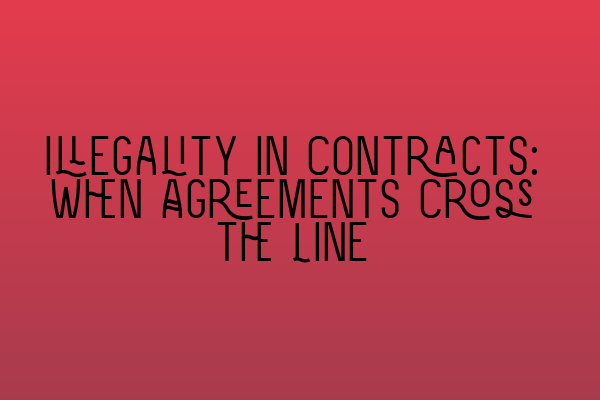Illegality in Contracts: When Agreements Cross the Line
In contract law, parties enter into agreements with the expectation of fulfilling their obligations and reaping the benefits promised. However, sometimes these agreements may involve activities that go against public policy or contravene the law. When an agreement crosses the line of legality, it becomes unenforceable and can result in severe consequences for the parties involved. In this article, we will explore the concept of illegality in contracts and the implications it has on contract validity.
The principle of legality requires contracts to be lawful in order to be enforceable. Contracts that involve illegal activities or that seek to undermine public policy are considered void and unenforceable from the outset. The rationale behind this principle is to discourage and prevent parties from engaging in unlawful behavior or seeking to profit from illegal activities.
There are several categories of illegality that can render a contract unenforceable. These include:
1. Contracts Contrary to Statute: When a contract is in direct violation of a statute or legislation, it is deemed illegal. For example, a contract for the sale of illegal drugs or weapons would be unenforceable due to its contravention of criminal law.
2. Contracts Contrary to Public Policy: Contracts that are contrary to public policy, even if not explicitly prohibited by statute, are considered illegal. Public policy refers to principles that are considered fundamental and necessary for the well-being of society. This can include contracts that are unconscionable, oppressive, or in restraint of trade.
3. Contracts with Unilateral Illegal Purpose: If the sole purpose of a contract is illegal, the entire agreement is considered unenforceable. For example, if two parties enter into a contract to bribe a government official, the contract would be void as its purpose is illegal.
4. Contracts with Partial Illegality: In some cases, a contract may contain both legal and illegal elements. In such situations, the court may enforce the legal portion of the contract while disregarding the illegal part. This concept is known as severance, where the court separates the legal and illegal parts of the contract.
It is important to note that illegality can arise not only from the subject matter of the contract but also from the manner in which the agreement is executed. For instance, a contract may be unenforceable if it is the product of fraud, duress, undue influence, or misrepresentation.
The consequences of entering into an illegal contract can be severe. Parties who engage in illegal activities may face civil and criminal penalties, including fines, imprisonment, and reputational damage. Additionally, any benefits obtained from an illegal contract may be confiscated or invalidated.
To avoid the pitfalls of illegality in contracts, it is crucial to seek legal advice before entering into any agreement. Qualified solicitors can assess the legality and enforceability of contracts, ensuring that they comply with applicable laws and regulations. By consulting a solicitor, parties can mitigate the risks associated with illegal contracts and protect their interests.
In conclusion, illegality in contracts occurs when agreements cross the line of legality by involving activities contrary to public policy or in violation of the law. Such contracts are unenforceable and can lead to severe penalties. To navigate the complexities of contract law, it is essential to consult with a solicitor who specializes in contract law and can provide guidance on the legality and enforceability of agreements. Avoid the pitfalls of illegality and protect your interests by seeking professional legal advice.
Related Articles:
– SQE 1 Practice Exam Questions
– SQE 1 Practice Mocks FLK1 FLK2
– SQE 2 Preparation Courses
– SQE 1 Preparation Courses
– SRA SQE Exam Dates
